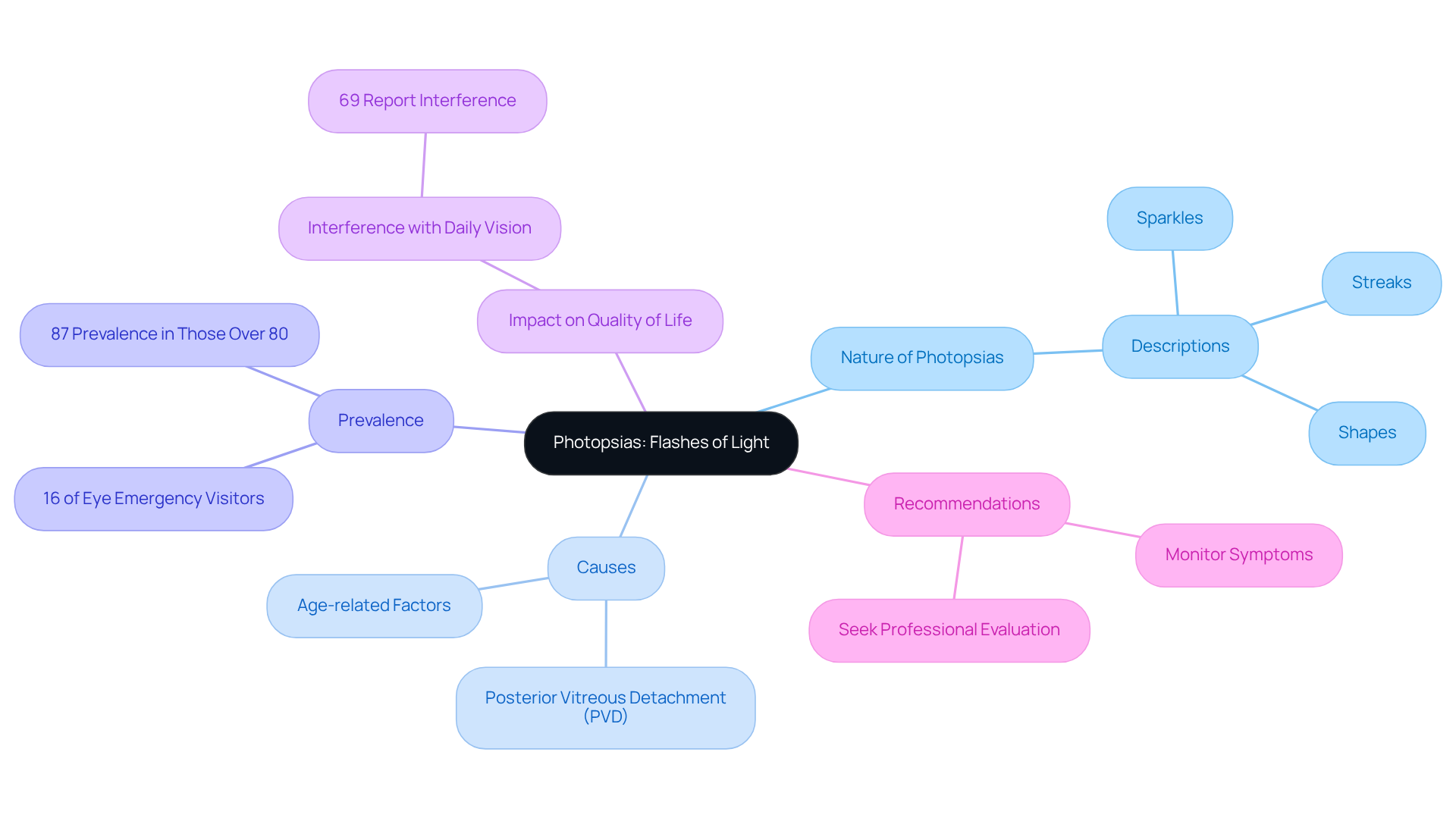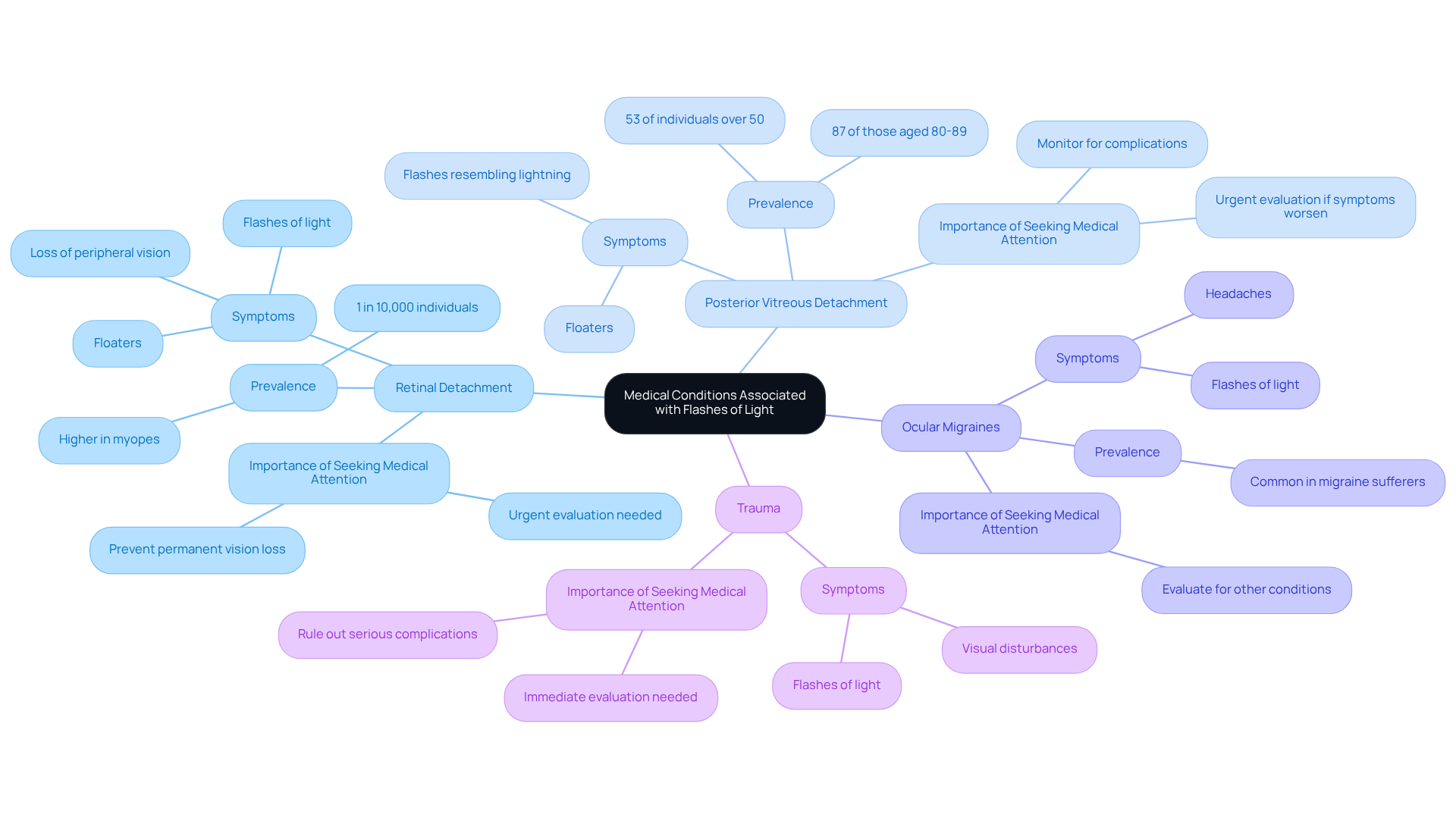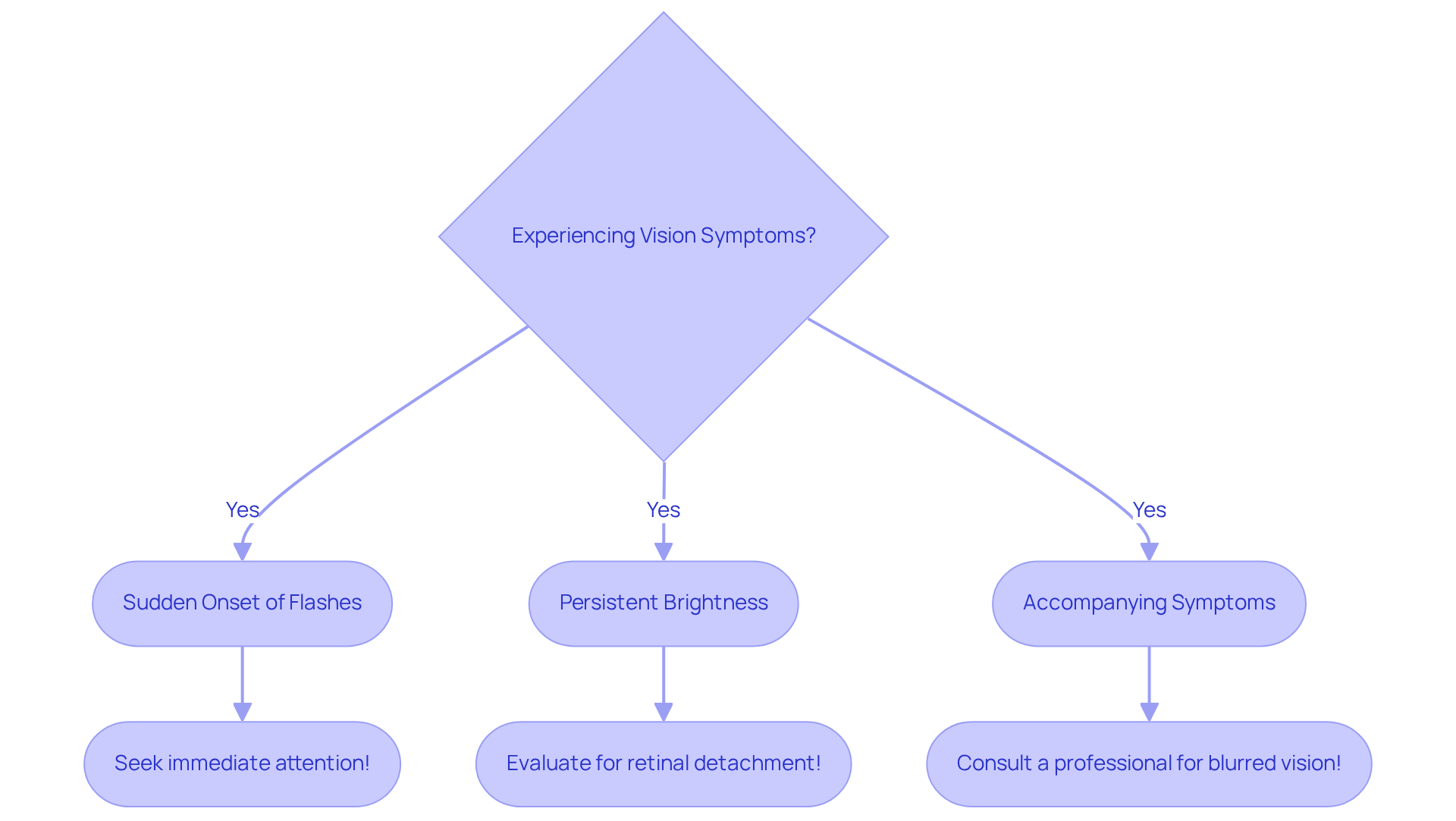Posted by: Northwest Eye in General on November 5, 2025
Overview
Experiencing flashes of light, similar to a camera flash, can be concerning. We understand that this might raise questions about your eye health. While these visual disturbances can often be linked to aging, it’s essential to recognize that they may also indicate underlying conditions that require prompt medical evaluation, such as retinal detachment.
It’s common to feel anxious when noticing sudden changes in your vision. Remember, you’re not alone in this. Many people experience similar symptoms, and it’s crucial to pay attention to any accompanying signs. If you notice sudden changes, don’t hesitate to reach out to a healthcare professional. Taking action early can make a significant difference in maintaining your eye health.
We are here to help you through this process. Your well-being is our priority, and we encourage you to seek care if you have any concerns. Together, we can ensure that your vision remains clear and healthy.
Introduction
Experiencing sudden flashes of light, similar to a camera flash, can be quite unsettling. Many people encounter these visual disturbances, known as photopsias, and it’s completely normal to feel concerned. These flashes can range from harmless to signs of more serious eye conditions, which is why understanding their implications is so important.
So, what should you do when faced with these disconcerting flashes? We understand that it can be alarming. This article will explore the nature of these visual disturbances, discuss potential medical conditions associated with them, and highlight critical signs that indicate it’s time to visit an eye care professional. Remember, you’re not alone in this, and we are here to help you through the process.
Explore the Nature of Visual Disturbances: Flashes of Light
Flashes of light, which can be described as seeing a flash of light like a camera flash, are known medically as photopsias and can be unsettling. These transient visual disturbances appear without any external light source and are often described by patients as sparkles, streaks, or shapes reminiscent of lightning bolts, akin to seeing a flash of light like a camera flash. They typically occur in various areas of the visual field, especially in peripheral vision. We understand that experiencing these phenomena can raise concerns, as they may signal underlying eye conditions. For instance, the vitreous gel in the eye can pull on the retina, a common occurrence as we age. Research indicates that about 16% of individuals visiting eye emergency facilities report experiencing light sensations and/or floaters, highlighting how common these symptoms can be.
As we age, the frequency of these bursts of light tends to increase. Posterior vitreous detachment (PVD) is a condition that occurs when the vitreous gel shrinks and separates from the retina. This is particularly prevalent among adults aged 50 to 70, with a staggering 87% prevalence in those over 80 years old. PVD is often the leading cause of sudden onset floaters or seeing a flash of light like a camera flash. Moreover, studies show that 69% of individuals experiencing photopsia report that it interferes with their daily vision, underscoring the impact these disturbances can have on quality of life.
Recent research has illuminated the characteristics of photopsias, revealing that they can vary in both frequency and intensity. Ophthalmologists emphasize the importance of recognizing new signs, such as seeing a flash of light like a camera flash or a sudden increase in floaters, as these may indicate a higher risk of retinal tears or detachment. For example, the presence of vitreous hemorrhage or subjective visual reduction significantly raises the likelihood of retinal complications, making it essential to seek prompt evaluation from an eye care professional.
In conclusion, while bursts of light can be a harmless part of aging, they might also signal significant underlying issues. If you encounter these symptoms, we encourage you to pursue a comprehensive assessment to rule out potential retinal concerns. Taking this step ensures timely intervention and helps maintain your eye health. Remember, we are here to help you through this process.

Identify Medical Conditions Associated with Flashes of Light
Seeing a flash of light like a camera flash can be concerning, and it’s important to understand what it might mean. Here are some conditions that could be at play:
-
Retinal Detachment: This serious condition happens when the retina separates from the back of the eye. You might notice seeing a flash of light like a camera flash, as well as floaters. It’s crucial to seek prompt diagnosis and treatment to prevent permanent vision loss. Did you know that the incidence of rhegmatogenous retinal detachment (RRD) is about 1 in 10,000 individuals? It’s even higher in those with myopia.
-
Posterior Vitreous Detachment (PVD): Commonly associated with aging, PVD occurs when the vitreous gel contracts and separates from the retina. This can lead to bright spots that look like lightning or fireflies. The prevalence of PVD increases significantly with age, affecting around 53% of individuals over 50 and up to 87% of those aged 80-89. If you’re experiencing light sensations or floaters, know that 19% of patients with these symptoms have PVD. While PVD is generally not sight-threatening, it can lead to complications such as seeing a flash of light like a camera flash, especially in the weeks following detachment.
-
Ocular Migraines: These can cause temporary visual disturbances, including seeing a flash of light like a camera flash, and are often accompanied by headaches. Recent studies suggest that these bursts may be linked to changes in blood circulation or electrical activity in the brain, rather than direct issues with the retina.
-
Trauma: Any injury to your eye or head can lead to light sensations due to irritation or damage to the retina. If this happens, it’s essential to get evaluated by an eye care professional right away to rule out serious complications.
Recognizing these conditions is vital. We understand that seeing a flash of light like a camera flash or floaters can be alarming. Seeking medical assistance promptly can greatly improve outcomes and help prevent lasting vision loss. Eye care professionals emphasize the importance of reaching out if you notice sudden increases in light spots or floaters. These could indicate underlying issues that need immediate attention. Remember, we are here to help you through this process.

Determine When to Consult an Eye Care Professional
If you’re experiencing any of the following symptoms, it’s crucial to consult an eye care professional:
-
Sudden Onset of Flashes: If you notice flashes appearing suddenly, especially if they come with a significant increase in floaters or a shadow in your vision, please seek immediate attention. It’s important to know that individuals who experience a sudden appearance of spots and floaters have a 14% chance of retinal tears. This highlights the necessity for timely assessment.
-
Persistent Brightness: Ongoing bursts of light, akin to seeing a flash of light like a camera flash, that don’t fade over time should be evaluated. Persistent symptoms may indicate underlying issues like retinal detachment, which is a medical emergency that can lead to permanent vision loss if not addressed promptly.
-
Accompanying Symptoms: If you are seeing a flash of light like a camera flash along with other signs such as blurred vision, loss of peripheral awareness, or eye discomfort, it’s essential to seek immediate medical attention. Blurred vision can signal various conditions, including cataracts, diabetic retinopathy, macular degeneration, dry eyes, and uncorrected refractive errors. These require professional diagnosis and treatment, as they can indicate serious health concerns that need immediate action.
It’s also worth noting that about 25% of people experience vitreous humor shrinkage by age sixty, which can contribute to visual disturbances. Dr. Anthony Roberts emphasizes the importance of acting quickly when you notice these symptoms. Regular eye exams are vital for detecting potential problems before they escalate, especially for those over 50 or with risk factors like a history of eye conditions. Early consultation can lead to timely diagnosis and treatment of critical issues like retinal tears or detachments, significantly improving your chances of preserving vision.
We are here to help you through this process. Schedule an appointment with a Northwest Eye doctor to ensure your eye health is monitored regularly.

Conclusion
Experiencing flashes of light, often likened to a camera flash, can be perplexing and concerning. We understand that this phenomenon can stir up feelings of worry. While many instances of photopsia are benign and linked to the natural aging process, they can also signal more serious eye conditions. Recognizing the nature of these visual disturbances and knowing when to seek professional help is crucial for safeguarding your eye health.
This article explores various causes of flashes of light, including:
- Posterior vitreous detachment
- Retinal detachment
- Ocular migraines
- Trauma
Each condition carries its own risks, highlighting the importance of being vigilant about changes in your vision. If you notice sudden onset flashes, persistent brightness, or accompanying symptoms like blurred vision, it’s essential to consult with an eye care professional right away. These symptoms are particularly prevalent among older adults, underscoring the need for regular eye examinations to catch potential issues early.
Ultimately, being proactive about your eye health can lead to timely interventions and better outcomes. If you’re experiencing flashes of light, don’t hesitate to seek medical evaluation. Early diagnosis can significantly reduce the risk of permanent vision loss. Prioritizing eye care and being aware of visual disturbances is essential for maintaining your overall well-being and ensuring that any underlying conditions are addressed promptly.
Frequently Asked Questions
What are flashes of light and how are they medically referred to?
Flashes of light are medically known as photopsias. They are transient visual disturbances that appear without any external light source and can be described as sparkles, streaks, or shapes resembling lightning bolts.
Where do flashes of light typically occur in the visual field?
Flashes of light typically occur in various areas of the visual field, especially in peripheral vision.
What could cause flashes of light to occur?
Flashes of light can occur due to the vitreous gel in the eye pulling on the retina, a common occurrence as people age. This can lead to conditions such as posterior vitreous detachment (PVD).
How common are flashes of light among individuals visiting eye emergency facilities?
Research indicates that about 16% of individuals visiting eye emergency facilities report experiencing light sensations and/or floaters.
How does age affect the frequency of flashes of light?
As individuals age, the frequency of these bursts of light tends to increase. PVD, which is prevalent among adults aged 50 to 70, occurs in 87% of individuals over 80 years old.
What percentage of individuals experiencing photopsia report that it interferes with their daily vision?
Studies show that 69% of individuals experiencing photopsia report that it interferes with their daily vision.
Why is it important to recognize new signs of flashes of light or an increase in floaters?
Recognizing new signs, such as flashes of light or a sudden increase in floaters, is important because they may indicate a higher risk of retinal tears or detachment.
What should someone do if they experience flashes of light or an increase in floaters?
It is essential to seek prompt evaluation from an eye care professional to rule out potential retinal concerns and ensure timely intervention.
Can flashes of light be harmless?
While bursts of light can be a harmless part of aging, they might also signal significant underlying issues, making it important to pursue a comprehensive assessment if symptoms occur.






